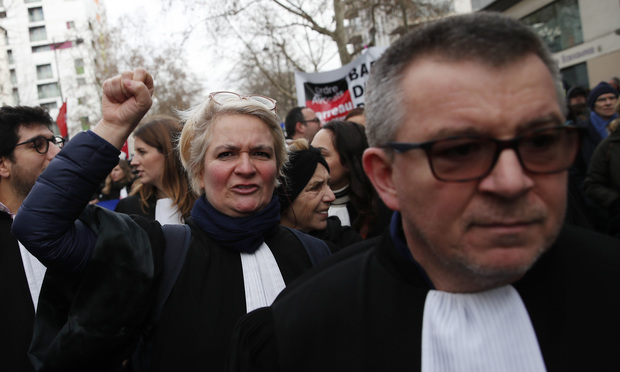French Lawyers Stiffen Their Resolve to Combat Pension Reforms
France's national bar association has vowed to continue protests despite government assurances.
February 11, 2020 at 07:42 PM
6 minute read
 French lawyers attend a demonstration Jan. 11, 2020, in Paris. (AP Photo/Francois Mori)
French lawyers attend a demonstration Jan. 11, 2020, in Paris. (AP Photo/Francois Mori)
The strikes over pension reform that have hobbled large sectors of the French economy since early December have pretty much petered out. But French lawyers are stiffening their resolve, vowing to continue work stoppages and protests that have already led to major delays in French courts.
The Conseil National des Barreaux (CNB), or National Bar Council, rejected the government's latest offer to phase in changes to how lawyers' state-run pension plans are funded and paid out, part of a broader reform aimed at consolidating France's many disparate retirement regimes under one state umbrella.
The CNB, which represents 70,000 lawyers admitted to the French bar, asserted that the proposed changes, including raising mandatory contributions on lower incomes, would hurt small practitioners and would imperil the timely provision of legal services.
"It is a threat to the independence and business model of the attorney, and therefore a threat to access to proper representation," the CNB wrote Tuesday in an open letter to Justice Minister Nicole Belloubet and the secretary of state for retirement, Laurent Pietraszewski.
Clad in the court attire of black robes and white neckpieces that earn them the nickname "les pingouins" (penguins), French lawyers have periodically taken to the streets, most recently on Feb. 3, since the strikes began Dec. 5. The government intends to pass the reforms this spring. Protesters hope to force the government to soften or even abandon the reform plans before the measures go to the National Assembly, or parliament, for debate later this month.
The French retirement system, one of the most generous in the world, is also one of the most complicated. Within the public pension system are 42 different plans for different professions and categories of workers, from ballet dancers to railroad workers, and a variety of rules, minimum retirement ages and methods of calculating payout.
Many professions, including lawyers, also have mandatory-contribution public-private pension funds that top up the public payout. That top-up can be considerable, depending on the profession and the size of the fund.
The Macron government wants to bring all workers under a single system that, the government asserts, would be more fair to all—assertions that unions and other groups representing French workers have rejected, disputing how the new system would be applied and funded.
While a change to lawyers' pensions should not affect the many non-French lawyers seconded to international firms in France, they will affect any lawyer on a French work contract who contributes to the French pension system—a group that includes many lawyers at international firms as well as in-house counsel.
And while the proposed changes will not have much of a financial impact on lawyers who make big-city incomes and count on substantial private savings for their retirement income, lawyers making modest incomes—a group that includes many solo practitioners, small firms, and lawyers practicing outside of major cities—would feel the effect of any significant rise in pension contributions or decrease in payouts, lawyers said.
For example, the original proposals called for a doubling, to 28% of gross income, of the rate of mandatory retirement contributions by lawyers making less than €40,000 (about $44,000) a year. To soften the blow in response to the prolonged protests, the government last week proposed a partial rebate on some employment taxes until 2029, and a phase-in period for the higher contributions until 2040 or 2054. These moves, Belloubet wrote to the CNB on Feb. 8, would result in higher pension payouts—in some cases 13% more per year.
The CNB on Tuesday rejected those assertions, writing that "the financing is still not defined," so there was no guarantee the government could live up to its promises.
With reserves of €2 billion, the lawyers' supplemental retirement fund is one of the more robust in the country. Some of the strike sentiment, lawyers here say, is driven by fears that as retirement regimes are combined, the lawyers' reserves will be absorbed into a general fund to make up shortfalls in other groups' accounts. The government denies that this will happen, according to Belloubet's Feb. 8 letter to the CNB.
In the meantime, all lawyers, particularly litigators, are dealing with procedural delays caused by their striking "confrères" – delays that may even be strategic, according to Dana Anagnostou, co-managing partner at Kramer Levin Naftalis & Frankel in Paris.
"Lawyers who want a delay but don't think they can get one can say they are supporting the strike, so they can't appear, so their hearing needs to be continued," she said. "It's more of an issue in cases where opposing counsel need to argue before a judge, but it can happen."
Anagnostou added that lawyers who support the goals of the strike are grappling with how to balance that support with their obligation to go to court to serve clients' interests. "It's a conversation that every lawyer is having with themselves," she said.
The French bar has issued guidance that encourages lawyers to cooperate in agreeing to postponements because of the strikes, while also taking into consideration the urgency of the matter and the client's interest.
In the meantime, small practitioners—the presumed beneficiaries of the protests—are also the ones bearing the brunt of business disruptions in legal procedures being delayed because of the strikes, according to Isabelle Hamdache, a solo practitioner and labor and family law specialist in Paris.
"Like many lawyers, I am paid a fixed fee per procedure and an 'honoraire de résultat,'" or fee for completion, she said in an interview Tuesday. "If a matter is pushed out, then so is the completion fee. The delay could be two months in lower court and easily a year in the Court of Appeal. A larger practice can absorb that more easily."
Hamdache supports the CNB's position and the right to strike, but she regrets that the protests are taking a toll on client service, which ultimately reflects back on the lawyer. "If the client supports the strikes, he might be more understanding," she said. "But if the matter is delayed, the client is inconvenienced—and nobody wants that."
This content has been archived. It is available through our partners, LexisNexis® and Bloomberg Law.
To view this content, please continue to their sites.
Not a Lexis Subscriber?
Subscribe Now
Not a Bloomberg Law Subscriber?
Subscribe Now
NOT FOR REPRINT
© 2025 ALM Global, LLC, All Rights Reserved. Request academic re-use from www.copyright.com. All other uses, submit a request to [email protected]. For more information visit Asset & Logo Licensing.
You Might Like
View All
X Ordered to Release Data by German Court Amid Election Interference Concerns

Quinn Emanuel's Hamburg Managing Partner and Four-Lawyer Team Jump to Willkie Farr

Trump ICC Sanctions Condemned as ‘Brazen Attack’ on International Law

U.S.- China Trade War: Lawyers Label WTO Dispute Pointless, Clients Have Their Hands Tied
Trending Stories
- 1States Accuse Trump of Thwarting Court's Funding Restoration Order
- 2Microsoft Becomes Latest Tech Company to Face Claims of Stealing Marketing Commissions From Influencers
- 3Coral Gables Attorney Busted for Stalking Lawyer
- 4Trump's DOJ Delays Releasing Jan. 6 FBI Agents List Under Consent Order
- 5Securities Report Says That 2024 Settlements Passed a Total of $5.2B
Who Got The Work
J. Brugh Lower of Gibbons has entered an appearance for industrial equipment supplier Devco Corporation in a pending trademark infringement lawsuit. The suit, accusing the defendant of selling knock-off Graco products, was filed Dec. 18 in New Jersey District Court by Rivkin Radler on behalf of Graco Inc. and Graco Minnesota. The case, assigned to U.S. District Judge Zahid N. Quraishi, is 3:24-cv-11294, Graco Inc. et al v. Devco Corporation.
Who Got The Work
Rebecca Maller-Stein and Kent A. Yalowitz of Arnold & Porter Kaye Scholer have entered their appearances for Hanaco Venture Capital and its executives, Lior Prosor and David Frankel, in a pending securities lawsuit. The action, filed on Dec. 24 in New York Southern District Court by Zell, Aron & Co. on behalf of Goldeneye Advisors, accuses the defendants of negligently and fraudulently managing the plaintiff's $1 million investment. The case, assigned to U.S. District Judge Vernon S. Broderick, is 1:24-cv-09918, Goldeneye Advisors, LLC v. Hanaco Venture Capital, Ltd. et al.
Who Got The Work
Attorneys from A&O Shearman has stepped in as defense counsel for Toronto-Dominion Bank and other defendants in a pending securities class action. The suit, filed Dec. 11 in New York Southern District Court by Bleichmar Fonti & Auld, accuses the defendants of concealing the bank's 'pervasive' deficiencies in regards to its compliance with the Bank Secrecy Act and the quality of its anti-money laundering controls. The case, assigned to U.S. District Judge Arun Subramanian, is 1:24-cv-09445, Gonzalez v. The Toronto-Dominion Bank et al.
Who Got The Work
Crown Castle International, a Pennsylvania company providing shared communications infrastructure, has turned to Luke D. Wolf of Gordon Rees Scully Mansukhani to fend off a pending breach-of-contract lawsuit. The court action, filed Nov. 25 in Michigan Eastern District Court by Hooper Hathaway PC on behalf of The Town Residences LLC, accuses Crown Castle of failing to transfer approximately $30,000 in utility payments from T-Mobile in breach of a roof-top lease and assignment agreement. The case, assigned to U.S. District Judge Susan K. Declercq, is 2:24-cv-13131, The Town Residences LLC v. T-Mobile US, Inc. et al.
Who Got The Work
Wilfred P. Coronato and Daniel M. Schwartz of McCarter & English have stepped in as defense counsel to Electrolux Home Products Inc. in a pending product liability lawsuit. The court action, filed Nov. 26 in New York Eastern District Court by Poulos Lopiccolo PC and Nagel Rice LLP on behalf of David Stern, alleges that the defendant's refrigerators’ drawers and shelving repeatedly break and fall apart within months after purchase. The case, assigned to U.S. District Judge Joan M. Azrack, is 2:24-cv-08204, Stern v. Electrolux Home Products, Inc.
Featured Firms
Law Offices of Gary Martin Hays & Associates, P.C.
(470) 294-1674
Law Offices of Mark E. Salomone
(857) 444-6468
Smith & Hassler
(713) 739-1250








